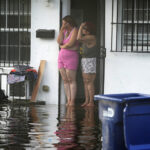Catlin Group Limited announced the launch of its next “Seaview Survey,” which it described as a “significant expansion of its study of coral reefs with a new campaign in the Caribbean and Bermuda.” The survey is the latest to be sponsored by the Catlin Group, following its initial exploration of the Arctic and Australia’s Great Barrier Reef.
Catlin said the program would “significantly widen opportunities for ocean, coral and climate scientists to understand the changes occurring within the region.” It will begin in Belize and then “moves on to Mexico, Anguilla, St. Vincent, Guadeloupe, Turks and Caicos and the Bahamas in the coming months. The Catlin Seaview Survey will also explore the coral reefs off Bermuda in September.
“Coral reefs in the Caribbean and Atlantic, like elsewhere, are under growing environmental stress,” the bulletin explained. “Being highly sensitive to environmental change, corals are considered the ‘canary in the coal mine’ when it comes to impacts of climate change and ocean acidification. Exploitation, pollution, warming waters and increased storms linked with climate change has caused the massive loss of corals across the Caribbean over the past 50 years.”
Coral reefs are also a part of the economic structure for many coastal communities. Their loss “has long-term implications for Caribbean economies given their dependence on reefs and other marine ecosystems for goods, services and economic welfare.
“According to the World Resources Institute, the value of shoreline protection provided by Caribbean reefs is between $700 million and $2.2 billion per year. Within the next 50 years, coral degradation and death could lead to annual losses totaling $140 million to $420 million.”
The insurance group’s chief executive Stephen Catlin said: “We are committed to understanding the future risks posed by climate change. It is not only important that scientists have access to this valuable data, but insurance companies such as ours must understand the impact that significant changes to our environment will have on local economies.”
Such a study is badly needed, as coral reefs globally “are in an unprecedented state of decline due to pollution, overfishing and climate change.” The bulletin cited a prediction from the US National Oceanic and Atmospheric Administration (NOAA), which concluded that there will be “increasing frequency and severity of mass bleaching events over the coming years.
Catlin described the study as a “race against time to survey the coral reefs of the world,” explaining that the “Caribbean serves as an ideal launching point to take the campaign global because of the stress already experienced by its reefs.”
Richard Vevers, Project Director for the Survey, said: “The Caribbean was chosen to launch the global mission because it is at the frontline of risk. Over the last 50 years, 80 per cent of the corals in many places in the Caribbean have disappeared because of coastal development and pollution. They now are also threatened by invasive species, climate change and ocean acidification – it’s the perfect storm.”
Catlin also said it expects that the “state of the Caribbean reefs will provide insights into the future prospects for coral reefs in other regions of the world.”
The survey will focus specifically on four major scientific goals, described as follows:
— Change detection – creating a Caribbean-wide ecological baseline: Accurate measurements of the current state of the coral reefs in the Caribbean are crucial to support timely decisions about their management.
— Understand coral reef stress – when, where and how much?: The Catlin Seaview Survey team will use direct measurements as well as data from NOAA and NASA satellite systems to understand how patterns in the health of coral reefs (e.g. coral cover, reef complexity) are influenced by local and global stressors such as changes in sea temperature, coastal pollution, fishing intensity, and exposure to wave stress and storms. This will fill in critical gaps in our understanding of why coral reefs have been in decline over the past 50 years.
— Understanding climate change vulnerability. The Catlin Seaview Survey’s work during 2012 on Australia’s Great Barrier Reef has revealed that mesophotic (deep water) coral reefs may play an essential role in regenerating shallow water reef systems. The Survey will gather a more comprehensive understanding of the threat of climate change to coral reefs in the Caribbean by using similar techniques and technologies to map mesophotic coral reefs in the region and to investigate the genetic connectedness of those reefs to shallow water reef systems.
— Produce new tools for understanding changes in tropical reef systems: Rapid, semi-automated and rigorous surveys of coral reefs are essential for developing an understanding of the rates of change, vulnerability and priorities for management intervention.
The Catlin Seaview Survey has teamed up with the Global Change Institute at The University of Queensland in Australia and the Scripps Institution of Oceanography in La Jolla. Scripps is working with the global change Institute to develop autonomous assessments of the hundreds of thousands panoramic images taken of the reefs within the Caribbean.
“These partnerships are essential to the success of the research program,” said Professor Ove Hoegh-Guldberg, Chief Scientist of the Catlin Seaview Survey. “By collecting and analyzing images in a semi-autonomous fashion, the research project can cover huge distances. This has never been done before.”
The study will also conduct research on climate change and what the implications are for the insurance industry. The bulletin points out that “five hundred million people worldwide rely on coral reefs for food, tourism, economic stability and shoreline protection. When reefs are harmed or destroyed due to climate change and regional drivers, the effects can be devastating and far-reaching.
“There is a shift in the insurance industry; evaluating and helping clients minimize risk is critical to business, the assessment of the impact of climate change is a natural extension for the future of the insurance industry.”
Backing up that assertion is a study from the Geneva Association, the international association for the study of insurance economics. In a report released last June – “Warming of the Oceans and Implications for the (Re) Insurance Industry” – it stressed the impact of climate change on the warming of oceans and the correlating effect on the insurance industry’s risk assessment strategies.
The report highlights the following three main drivers of change:
— Greater Volumes of Water = Greater Risk: Not only do rising sea levels increase the risk of flooding or the potential impact of storm surges, but they also decrease the protective lifespan of coastal infrastructure. While the probability of a storm is not increased, the damage caused by one is.
— Warmer Ocean = More Water in the Atmosphere: A warmer atmosphere contains more water and therefore more energy. This has the potential to increase the intensity of extreme events and associated precipitation. This greater intensity increases the loss potential of natural catastrophes.
— Effect on Large-Scale Climate Patterns: The warming of the oceans is also likely to affect large-scale climate patterns such as El Niño, various monsoon systems and/or the North Atlantic Oscillation.
More information, as well as photos of the area, can be found on the Seaview Survey’s dedicated website.
Source: Catlin Group
Topics Trends Climate Change Market Pollution Australia
Was this article valuable?
Here are more articles you may enjoy.


 Coverage Needed: Hundreds of Thousands in SE Now in Flood Zones With New Maps
Coverage Needed: Hundreds of Thousands in SE Now in Flood Zones With New Maps  ‘Great Resignation’ Enters Third Year as Workers Embrace AI, Upskilling, PwC Says
‘Great Resignation’ Enters Third Year as Workers Embrace AI, Upskilling, PwC Says  Farmers Adjusters Cry Foul Over Workloads, Claims Handling in Letter to Regulators
Farmers Adjusters Cry Foul Over Workloads, Claims Handling in Letter to Regulators  Allstate, Nationwide Post Dramatic Q12024 Homeowners Loss Ratio Drops: S&P
Allstate, Nationwide Post Dramatic Q12024 Homeowners Loss Ratio Drops: S&P 

